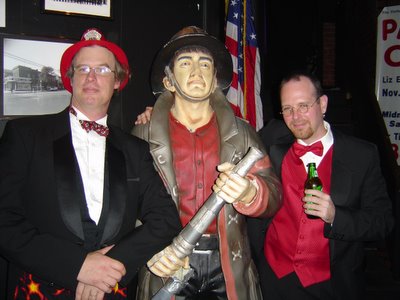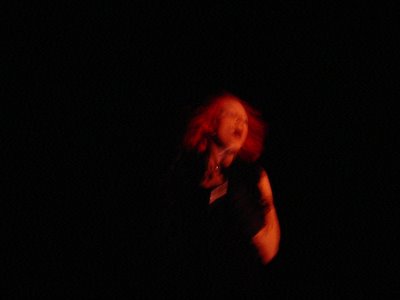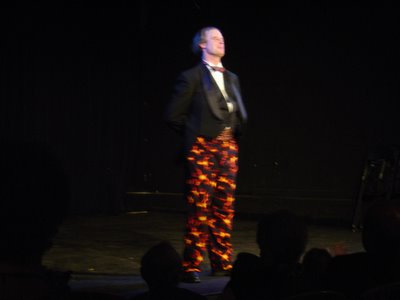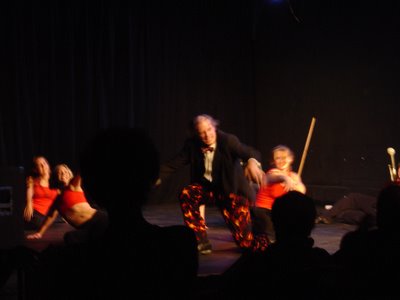
Meditations And Contemplations Pertaining To Fundamental And Profound Aspects Of The Current Situation While At The Blue Raccoon's Bar
Professor of Mixology and Applied Contemporary Interfaith Hermeneutic Therapy, Her Excellence and Hottitude, Carlisle Montgomery, Presiding
"This is stupid, I think I'll go home/what's the use of moving Uptown/Flying to Rome on your credit card/An endless parade of lawyers and finance/plenty of time and nothing to do....Give me new noise/Give me new affection/Strange new toys from another world/I need to seem more than three dimensions/ Stranger than fiction/Faster than light"--
"What Use," The Information Society
For some reason Yellow's 1980s single-hit, "Oh, Yeah" was blaring when I entered the Blue Raccoon on a recent afternoon. The weather here in Richmond, Vee-ay is keeping to its typical February freakishness, gyrating from 70s to 20s in a six hour period, alternating April sunshine with, well, winter snow and ice. So it was that the crew clustering at the bar and at the low slung banquette couches were caught between heavy pull over turtlenecks and boots, and kahkis and at least one pair of shorts and a pair of shapely legs, as I saw them, curled up underneath herself as she talked to her goateed hipster help mate, or whatever, wearing urban black from his big glasses rims to his boots.
I assessed with rapid precision the potential conversational viability of those perched on the giant cocktail swivel stools. Some loud discussion was going on, everyone talking at once, and Carlisle Montgomery in control behind the bar exhibiting her right to bare freckled kayak-strengthened arms. She'd arranged her copper amber hair into plaited pig tails, like Pipi Longstocking if she grew up to be a bartender at some arty establishment in Richmond, Vee-ay. Lewis Poole paintings waxed and waned in slide show fashion on the flat screen behind the bar.
In attendance was "Dr. DD" or Doctor Dee, the university prof whose first and last name are the same, though spelled different, and whose identity I cannot reveal. He was buried in a New York Times an demonstrating an apparent obliviousness to the surroundings.
Toward the other end hunched a grey tonsured and thick-lensed, ruddy faced, rather portly fellow who still thinks that the Blue Raccoon is his old dive a restaurant incarnation which it was until a couple years ago. There he regaled his peers about his experiences of growing up in the Golden Era of the Civilization, circa 1945.
We'll call him Buddy --which he is not.
The Alt Guy,who owns a stunning variety of T-shirts displaying the names of the teams of high schools he never attended, bowling teams for which he's not played, and odd trademark advertising like the Pep Boys, etc. that also allows him to show off his colorful assortment of tattoos. Today he wore a dark stocking cap pulled nearly level to his eyes as though he'd pulled off a heist. He thinks he's going to woo Carlisle.
He is not. We'll call him Chip.
Chip's always good for a quip though he smiles and bobs his head a little bit too much for me, and is fond of having loud cell phone discussions.
Chip's running partner and wing girl is, let's call her, well, Dale. She and Chip should be dating but they're way too self-conscious and narcissistic and cool for that whole Affection thang. She's tiny, but long-stemmed, though fond of leggings and a worn leather jacket festooned by buttons bearing the logos of bands, anti-government epithets and general liberal causes. Why people to turn themselves into billboards when they are first to fulminate about "brand washing" and the corporatization of everything, I cannot say. Her straight blonde hair streaked with pink and blue is cut á la Dutchboy. She smokes Marlboro Lights. She is part cyborg by her apparent attachment of her cell phone and text messaging and she and Chip often sit back to back, talking to their invisible friends, vigorous in pursuit of distractions that do not include each other. Ah, youth is wasted on the young.
Then there's Gary, the divorced actuary. I like Gary quite a bit, but he comes up to the 'Coon from somewhere in the cul-de-sac archipelago of Western Henrico County. He seems amused by most things while I suspect he's depressed. He saw me first.
"Heya, Harry," he called from the stool nearest the door. "Thank God you're here."
Carlisle gazed up from her draught-lever pulling and the flash of the glass door light reflected light into her green eyes that illuminated them in a way that makes many a man weak. I was prevented from making some embarrassing remark by the faithful at the bar hailing me. They all know me here.
Carlisle started a Legend Porter for me and slung a Blue Raccoon coaster at my customary place before I'd landed on the stool. Carlisle said, "The topic is politics and the fate of humanknd."
"Excellent," I said. "All I got at home is C-SPAN."
Buddy intoned, without interruption by my arrival or much anybody paying him serious mind, "--Carlisle, honey, listen. Listen to me."
"I'm listening, Nutty Buddy."
"See, now you're making fun."
Chip chortled. Dale was saying into her flip top Star Trek Classic Communicator-style cell phone, "Yeah, yeah, and he said they were there and all and like it was so fucking crowded you couldn't see."
Carlisle said, "I'm not making fun, but you are calling me honey," then she dashed to the back to place a food order with the kitchen.
Gary tried to explain that the conversation had reached a crescendo around the State of the Union Speech, energy conservation, the war, and he forgot what else.
"What party's like going to change anything," Chip provided.
"Neither," I sighed.
"You win," Carlisle said, and my Legend Porter was poured. "Your delicious dark beverage, sir."
"Ah, yes. I think I'll be needing it."
Buddy grumped, "So what? You gonna do what? Not vote? That's not going to do anything, either."
Chip said, "Vote Green or something else, man. If enough people vote like for alternative candidates, then, man, you'll see change."
Dale said, "Huh? I have to go outside, I'm losing you. Hello?"
"What's Carlisle think?" Gary asked.
Carlisle pulled in a corner of her mouth in her peculiar hemi-demi-semi quaver of a smirk.
"Oh, please," I said, trying not to sound enthusiastic. "I must know." I pulled out my little Rhodia pad, the ones that Amie brings me back from Paris--they are my Palm Pilots. I suspected this was headed for a rattling good blog entry. And a long one.
"This is what we're stuck with: the Demopublicans and Repocrats. This is where we are, OK? This is what we got."
"Zactly," Chip burbled. "They both suck."
"Some government political scheit," Dale said to her Communicator.
"The way they talk," Buddy, his face more crimson than usual, lowered his head toward his Miller High Life, a label so square that it's hip again. What was the Girl On The Moon whispering to sodden Buddy?
Carlisle mixed a row of drinks, slinging bottles and liqeurs in such a way that it resembled a Denishawn routine. She said, "Third parties are non-starters in this country. You know it."
Gary shrugged. "But if everybody says that."
Chip nodded. "Yeah, what he said."
"So, what, Gary, you going to revolve that opinion?"
"Right here from the Blue Raccoon," and he bopped the bar with his fist.
"Yuh, uh-huh. Keep dreamin'. You and Norman Thomas.--"
"Hey, he was a Socialist!" Buddy crowed. "That's yall's whole problem right there."
"Buddy, he lost."
"Carlisle I know that; I lived in those times."
Buddy glared at us all as though to challenge him and the windshield of a passing car reflected against his steel blue eyes, flashing on his face, and hiding his wrinkles like a Vanity Fair cover.
"--Here's the deal. We already had a Revolution. George Washington won it. With the help of Count Rochambeau and Admiral DeGrasse, but we don't talk about that."
That got a laugh from me.
"No, but seriously; even though we're stuck with lame-ass Democrats in terms of any kind of progress or reform. I know, laugh it up , all of you. I know. But I can't help it. This is the thing, this is where we are. And if you're trying to alter the course of the country, Chip, that's what you got to work with. And all you types can sit up in my bar and yak your fool heads off about whatever Green or Taupe or Chartreuse party; but long as they're not funded, and yeah, absolutely Gary, compromised out their ying yang, they ain't goin' no place. You know that line from the West Wing--I watch it on DVD and cry at night -- actually, I never cry because I'm a heartless soulless creature--I'm the Tin Man--that politics is like the slow boring of boards. True change--responsible change--takes time. Otherwise you're blowing up shit and lining up people against walls and shooting them and that's not fun."
"We're running out of time, Carlisle," piped up Dale, somehow not to her Communicator.
"It's always running out and its always later than you think. More coffee?"
Gary said, "But I think we deserve something better. At least different."
"A choice," Dale said. "Something I can feel good about."
Carisle frowned. "Well, you want to feel good, take a mood enhancer. If you're voting for Nader or the Greens or whatever, that's your own ego, not anyway to make an effective difference. People voted Nader in 2000 because they somehow felt this was a pure decision. Well. See where that got us."
"See," Buddy pointed. "This girl's got looks and brains."
Chip couldn't fathom her remark. "Carlisle, they stole the fucking election."
"Twice!" Dale held up her fingers.
"Didn't help that the opposite candidates ran awful campaigns," I said.
Gary asked, "Then, what, Carlisle, are we supposed to do?"
"I don't know--yes, the first election, Chip, I agree. Stolen. And bungled on the other side, too. The second one--eh. It wasn't any worse than any other election. We were just noticing it more."
"Oh, Carlisle--"
"--You gotta get the Demopublicans to find how to drag the national debate away from this endless loop of God, gays and guns on Fox News and get into the real meat of ideas and concepts that actually matter. Energy, the environment, transportation, education. And by the same token, if we're talking oil and wars and such, you want to bring in new energy technology, you gotta make it profitable for somebody. For anything to work, it's gotta make money."
Gary said, "I think that'll happen."
Chip laughed. "How do ya think?"
"Well, Exxon and BP will have to retool," Gary said, scratching his chin, "and put as much effort into their current extraction and refining for the new methods, whether it's ethanol or whatever."
Carlisle raised a brow, pouring beer. "Yeah, that's a bunch a hooey, too. Truly. And I'm all butterflies are beautiful, but I'm realistic It's so...annoying. It's like, OK, we're runing out of oil, so we'll just switch to diesel, or ethanol, or soybeans, or rice, or whatever, which takes more energy to produce than it makes. We'll get electric cars and plug them in--but the electricity is made by something, probably a coal-fired plant. And if we're growing our energy source--think about this why don'tchya?-- How in hell are we going to eat and power 230 million cars?"
Chip said, "Well, we can't have 230 million cars."
Buddy bleated, "This country can have as many cars as it can build and sell and drive."
"You can't, man," Dale said.
"Oh, God, so stupid," Chip murmured into her Communicator.
"And how did you get here today, Gary, and from how far."
He turned to me and coaxed me to laugh, and he unloosened his tie. "Yeah, OK. I came about 25 miles, up the interstate, just to see you."
"You rode your Vespa?"
"No, I drove my moderately priced used European sedan. I'll give you a ride."
"I'm flattered, and not that don't love you, but that behavior doesn't make Gaia happy. And if Gaia isn't happy, Carlisle's not happy."
"Who's Gaia?"
"The Earth," Dale said out of nowhere.
"So, what're you saying, Carlisle? Want me to go?"
"Not at all, dear heart. You stay right there, at least until we've solved all these problems. But-- there's the thing right there. You can't even to start to talk about changing anything unless you start changing your patterns. Like, or example, you like coming here, you need to move out of the suburbs."
"Well, Carlisle--"
"See?"
"Carlisle, the ex took all my money, OK? I'm not moving back into the Fan anytime soon."
"You can rent an apartment in town, just as well as where you live. Listen, Gary, I'm not slappin' you around for your life style choices."
"Um, actually you are."
Chip and Dale laughed. Even Buddy chuckled. DD rattled his paper.
"I'm not, really. OK. You know better. I know that you know better, and that's all that matters. But most other people don't."
Dale grunted. "Most people need a hobby or a lobotomy."
Buddy said, "Spoken like a true liberal."
"Who let Rush Limbo in here?"
"Lim-baugh, Lim-baugh, you gonna use it get it right."
Carlisle resumed, "All I'm saying is," she arranged glasses on a tray for a server. "You can't stick to The American Way Of Life forever and expect everything to work out. Long as oil is cheap enough, nobody's going to be pushing for a different energy policy. The only way you're going to change behavior is to raise the price and tax the stuff sky high."
"There we go," Buddy pointed again. "See? Taxes. Tax this bar stool. Tax my left nut, you would, if you could."
"Actually, Buddy, I find you taxing."
He blinked his beer poised in mid-sip.
"That's not very funny."
"And your left nut isn't, either," her cheeks went crimson.
Buddy chuckled.
"You're alright, Carlisle."
" No, I'm not. But let me finish. Hum. So. Taxes are how we pay for improvements, which the entire country is in denial about. Nobody wants to pay for anything, so nothing gets paid for, except for wars and stupid crap like that. But that's not my point. The way out of this is conservation, short term; long term is innovation, and, another thing, there's no silver bullet for any of this. That's a classic fallacy we got goin' on all through our history," she waved a beer glass in a wide arc in front of her. " This country is so huge, that no one thing is going to solve it for everybody. Wind energy'll work better in one place, ethanol in another, geothermal someplace else."
Buddy laughed. "That's chaos, nobody wants that. I gotta gas station right down the street. "
Gary pushed his glasses up. "Buddy, so that gas station is just there, until the end of time."
"Until the end of my time, which is all I care about."
Carlisle raised her water glass. "There it is. Ding ding ding. The phrase that pays."
"It's all about you, huh, Buddy?" said Chip, and he looked a little ill.
Gary finished, "I agree with Carlisle on this one hundred and fifty percent. Solutions made to fit the challenges of a locality is what's needed. There's no one-size-fits-all for something this big and weird."
"Oh, you types are so holy and right. Go ahead," he belched. "'Scuse me. You get your grease-powered Hyundai and I'll run you over in my Escalade. Which is how you look at it, anyway."
Gary put it to him. "Do you actually drive an Escalade?"
"Hell no, man," Buddy frowned. "Damn things drink too much gas!"
We groaned and Carlisle threw a balled up napkin at him.
She resumed, "Buddy thinks choice is chaos, OK. But Buddy, when's the last time you went into a grocery store's toothpaste aisle? Huh?"
"What are you talkin about?"
"I'm saying, you probably by the same kind of toothpaste, right? You know what you like."
"Carlisle, sweetheart, you lost me."
"I understand you, Carlisle," Gary said.
"Thank you, Gary. Buddy, if you'd looked a a newspaper lately you'd see, I think, that we're surrounded by chaos. But I'm thinking past you and into the life of my niece and her kids. What are they inheriting?"
"A fucking burnt out cinder," Dale said, fixing a look on Buddy as though he was about to drop an atomic bomb from his bar stool.
Buddy was wide-eyed. This was more than I'd heard her utter in a few visits.
"You're cute when you're angry," Buddy chortled.
"Smaller, smaller, smaller," Dale ignored him. "It's gotta go back to the way it was when you were a younger Buddy."
"Huh. I don't think you kids would like that too much. It was called the Depression."
I said, "No, no, I agree. Dale--and Chip--are saying--and correct me--but I think she's saying," I paused to collect ideas and expressions. "We need to simplify while also, Carlisle, using our technology to be more efficient and have, Gary, a political sensibility that supports setting sustainable standards. But, thing of it is, I think that if we were to, by some miracle by some kind of do-good drug infiltrating the water supply, somehow with deliberation choose to roll back our wild affluence, most people would consider that a violation of their rights and a kind of betrayal and defeat, not a means of long-term survival."
"That's your Socialism," Buddy interjected. "Tell you what's best for you."
"Buddy," I replied, my voice registering more irritation than I'd intended. "What's the difference between you over there shaking your finger at us. I don't get it with you."
Dale narrowed her eyes. "You like it so much in your head, Buddy, why don't you just go live in it and leave the rest of the country alone."
"What are you drinking, girl?" Buddy smiled and sipped his beer. "C'mon, we're just havin' fun here. Lighten up."
Carlisle tried to push us back into a conversation. "Here's the bottom line to it all. Life without oil is not strange. See? It's normal. Humans got gummed up with oil only since about the time of the Civil War. Barely half an eyelash of time, yet because --Buddy--we think everything was called into creation when we were born, that everything we know is supposed to last forever. You complain about the kids these days. You, my friend," she shook the open end of a glass at him, "are just as bad. You say they don't anything about anything, about how to do without, about not getting, about losing."
Buddy said, "Listen, girl. I got a dead wife, got some real good buddies killed in Korea and Vietnam," he coughed, " and I don't even want to get into my daughter. So don't tell me."
Everybody looked at their drinks. On the flat screen, a purple Lewis Poole house painting faded into another one with green shutters and a screened in porch. They were abstractions that looked like buildings.
"We've all lost things that are dear to us," Carlisle said, and cleared her throat. "I would like to see everybody gain more, but losing stuff that's not really as important as we think it is in the here and now."
I said, "So we need a synthesis of our leading edge technology and the most sensible and sustainable methods of maintaining our culture. So. That's great to sit here at the Blue Raccoon, with the luxury of leisure time, and make these passionate observations. But. We can't just sit in here drinking and chanting suburbia must die. "
"Yeah, I mean, well, at least not until Gary can move."
"Hey, I actually like my little pod o' suburbia. There's a pool, a clubhouse, they got these social mixers, everybody's about 10 years younger than me, some very nice looking ladies work out at Innsbrook--"
"Oh, I'm so sure," Carlisle said.
"None of them good as looking as you, though."
"Of course not."
"This goes without saying. But, and, you know, in Glen Allen, I'm ten minutes from work. From like around here, it'd be 20 minutes from here."
"There's the other issue," Carlisle said. "The Edge City is turning into its own thing, and, sadly, Gary, it's a fake thing. You want to destroy the Middle East? Get rid of their de-salinization plants and their water systems. Whoosh. Gone. The suburbs of this gray-uht land will evaporate if oil gets too precious. Outer burbia won't have any reason to exist. Those sprawling planned communities will either revert to, I dunno, wattle and daub huts and chicken farms or communes of right wing zealots who'll put their prophets in machine gun towers."
"Mad Max," Chip said.
"Escape From New York," Dale added.
"I'd vote W a third time if they let me," Buddy declared, for no particular reason.
Gary turned. "Buddy, you alright? You having a seizure?"
"Naw, but I got a huge pain in my ass, and I'm lookin' right at the cause."
"OK," Gary noded, and drank. "Please, Carlisle. You were saying. Oil, an aberration."
"Yup. We've never really adapted to the way an oil-based economy that has changed what would be our usual patterns of life. Technology has just about maxed out our society's ability to cope with it."
"Wait," I said. "Woah. You're not going down the Unabomber trail, are you Carlisle?"
"Nope," she laughed. "I'm not into exploding packages. I'd rather see ideas blow up in people's heads, where they can do some good. "
DD dropped his shields; that is, the New York Times. "How poetic. How idealistic, Carlisle. And how doomed. You can't inocculate people against their own ignorance. You know that."
"Huh," Buddy said. "Who rattled your cage, chuckles?"
Carlisle raised a brow, made her crazy smirk, thankful that Dr. Dee had joined the debate. She said, "But, what are we talking about, Dee? You know? What will make things change?"
"Change, you want to see change? Hiroshima and Nagasaki brought change. The hurricanes and the tsunamis last year made changes."
Chip tried to rescue the higher ideal. "So was the printing press, penicillin and insulin. And the Internet. They made changes."
DD waved him away. "Don't start up with that Sistine Chapel versus the cermatoria argument. Awful and beautiful. So what?"
Carlisle didn't fold. "The point here is, what future do we want? Because we can, in collaboration, choose a way. War? Economic and social collapse? Do we really want to be living through what would be our version Beirut or Bosnia and Sarajevo and Chechnya? What do we want? Make this downshifting happen of our own volition, using the systems we've perfected, or. I don't know.
Would it be so strange to eat food that's in season and grown down the road from us, by people we know, and let conspicuous consumption die the death from neglect that it deserves, and only hospitals and emergency and public services would use petroleum-based stuff."
"So, wait Carlisle," Dr. Dee jabbed his pipe stem into the air as prelude to firing it up. Dee is one of the few men I've ever witnessed smoke a pipe where it didn't look like an affectation. I think he may have been born holding one. "You don't want to go out into the fields and raise squash and succotash, but maybe your pal down the street will. And are you the one who'll cut off the chicken necks and gut the cow for the meat? You into that?"
"I'm a vegetarian," Carlisle said. "And I have my little victory garden in my tiny little back yard. So. If you expand that, into community gardens--and if it's about your survival and ability to sustain yourself and your family. Then, yeah. I can grow some prize-winning squash."
"What about the rest of us who aren't vegetarians?"
"You need to convert," Carlisle stated, and laughed, and that caused Chip to lower his head and smile.
"Thing is, like Buddy's saying, even considering such an option, or options, makes people think that they've lost. We don't want to live like his parents did in the Depression, though in many ways--and I'm not talking about civil rights and all that--we'd be substantially better off. And, with respect, Bud, that attitude's so, uh, teenaged."
"C'mere, Carlisle, I'll show you a teenaged attitude."
"Gross," Dale wrinkled her nose.
"What're you talkin' about, anyway?"
"This belief that I gotta have everything right now, or I'll die," Carlisle went on undaunted. "We have everything, or some of us do, and it's killing us. Until somebody at a national level sits in front of a television camera and looks us as a people right in the eye and tells us what the real deal is we'll never have a mandate to concentrate on coming to terms with these issues. If nobody does, we're done. You know, I'm not having kids. I'm not bringing them into this world."
"Jesus Christ, you guys are depressing as hell," Buddy said. He reached for his wallet. "See my grandkids? Look at them smiling. They ain't worried."
"That's because they don't know what's coming," announced Dr. Dee. "I'm sitting here listening to you guys drone on about saving the world. Why? You think this world's so worth saving?"
"You got another one handy, DD?" I asked.
That got another laugh from Carlisle who turned to the mix and chill machine for some frothy fruity drink.
DD frowned. "You know Carlisle," he raised his voice to compete with the grinding whining noise. "I remember when Jimmy Carter sat down in front of a fireplace with a sweater on and told the country it was in the grips of a malaise. Nobody knew what he meant. They thought he said mayonnaise and they wanted Duke's. You're not going to get a palatable set of truths for these people."
Chip flung his retort to him, "Not with Bush in there, that's for sure."
DD rolled his eyes. "It wouldn't matter. They've been lying to us forever and we by now we accept it. Like, hah, I saw Lewis Black the other day and he said, when the government didn't find any weapons of mass destruction in Iraq, why didn't they just make something up? He said, 'I'm used to my government lying to me. I'm comfortable with that.'"
Chip and Dale showed their mutual amusement. "Lewis Black rocks," Dale said, puffing on her Marlboro.
"And Carlisle, which Demo-publican, like you say, could possibly have the guts to do what you're suggesting? Hillary? Howard Dean?"
"That's Doctor Howard Dean."
"Oh, please."
"Burak Obama!" Chip blurted as though he'd scored Yahtzee.
DD rubbed his corduroyed brow. "Ahh, the savior of us all. Somehow, I'd rather he just stay in Congress a few terms, if he gets the chance. Let him get seasoned. As if it'll matter."
"Oh, I figured you'd be all about Hillary," Buddy said.
"You got that figured wrong," DD said. "She can't make up her mind about anything, she tries to play to the right too much, and anyway, the half of the country you're in, Buddy, would never vote for her."
"Condi Rice," Buddy said. "Smart, good-looking, black woman."
"You'd never vote for her," Carlisle said.
"Hell, I'd vote for her over that so-and-so McCain. Watch me. Put'er on the ballot. Bet me," and he extended his hand. Carlisle wiped with a rag her left, with the curious missing ring finger, holding out her lithe arm, and said, "What are we betting?"
"Marriage," Buddy said.
"Buddy, if Condi Rice gets elected President of the United States, I will marry you." They shook hands.
Their bar audience roared.
Dale said into her Communicator, "Yeah, maybe we can hook up with you guys over at Sticky Rice afterward."
Buddy excused himself, " After that excitement, gotta see a man about a horse."
Dale waited until Buddy was out of earshot to ask Carlisle why she put up with him.
"What can I do? He conveyed with the property. And he's a great tipper. And much as I've seen him in here, this is about as annoying as he gets. He's an old guy with opinions."
Gary tipped up his beer. "That's for sure. But you know, seems to me if we really wanted to get serious about energy and transportation that we'd reinvest in the railroads, especially passenger rail and, whattayacall, the trolleys, you know--"
"Light rail," I said. "Streetcars. Trams. Yeah, adapt a European model. I tell you, I was in Berlin a couple years ago, where there's the subway and the city-to- city rails, which are great. I got used to them because they're so convenient. I was back about a week when a friend of mine I don't see often was visiting in D.C. So, I wanted to see her. I drive the I-95 murderway to D.C., park at Ronald Reagan--is Buddy back yet?--and I get on the D.C. Metro and I meet her and we go around on the Metro all day. Fine. Then, I have to get back in my car for this nervewracking trip to Richmond. There should be a connecting bullet train between D.C. and Richmond. It's crazy. You know that they got a better way of doing it elsewhere and you wish we could've done the same thing here."
DD said, "Gary, for example, should be able to take a light train or some kind of interurban transit from out yonder to here. But you can thank GM and Goodrich tire, by the way, convicted in federal court for restraint of trade and driving the rail transit systems of many cities broke, or buying them out and taking them over to put in diesel buses. And Harry's right, though I hate to admit it--but in Europe, the municipalities own their transit, Germany, for example, has a state rail system. That just wasn't going to work here with your Whitneys and your Morgans and your Goulds."
I tried to fill in. "Saddest thing about this, is that Richmond was the first city in the world to have a practical electrical streetcar system--1888. Thanks to the big money behind big business, Richmond, like so many cities, caved. We were provinical too, and hamstrug by class and race issues, while thinking we were going the way of the future and we scrapped the system in 1949 and burned our trolleys in this weird Wagnerian pyre."
"Oh my God," Carlisle said. "How stupid."
"More than stupid. We completed our selling out to cars and that culture by building that damn trench through the middle of town," I gestured toward the Downtown Expressway. "And the interstate, which didn't need to run through Shockoe and Jackson Ward, but could've swung out. But it was all political and had nothing to do with what was good for anybody. Not really."
Carlisle stopped, gazed out the window, and said. "Wow. How different--how romantic--this town would be if we still had streetcars here."
"Ah, yes. Streetcars are what we desire. We'd have modernized most of them by now. Keeping some of the older ones still running around--like on Robinson, or Broad Street and Main, down through Shockoe, would've been fun, but you take the European ones, like I saw in Germany, and they're very sleek, and contemporary. I even like the sound of riding in them. I dream about what it would be like to have them here, in the place that birthed them."
"Yeah," Carlisle said. "Would make a huge difference in getting around. You know I don't have a car, haven't in years, and the buses are OK, but they got their problems with, ah, regularity," she smiled. "And a streetcar is just better."
DD grunted. "The train service is inexcusable here. Calling it Third World is an insult to the Third World. I've been on trains in Central Europe and Southeast Asia that were much better than what I've been on here."
Buddy limped back to the bar, not any happier, and he grumbled, "So go there then and leave us be."
"Wish I could, Buddy. You come with me?"
"I'm fine right here, thanks."
"Problem is," DD said, "passenger rail is hugely expensive especially if you want to set up some kind of national high speed system. But you might could offset that with high speed freight for the mail and bulk carriers. You need a national rail system because single lines paying the freight, pun intended, on their own revenue won't work. You do that and you don't tax rail property, and boom. You got your rail system."
Just then on the music, Beck was admitting to his being a loser. Carlisle nodded approval.
Chip stretched his arms. "Yeah, I dunno. It's all going to fall apart and we're headed for some nut case fascists running what ever pieces of the country that survive. We'll all just run for the trees and the abandoned suburbs, tear shit down and start over."
Carlisle pointed to my empty glass.
"Yeah, please," I said. "At least things won't fall apart before I get through this next beer."
"That's the spirit!" Buddy raised his glass in my direction.
Dr. Dee winced at Chip's description. "Thus endeth the Democratic Experiment of the United States of America. With the rattle of shot guns in the distance. 'Git off mah land, now, git!'" and he mimed a shot gun using his pipe as the stock. "Not so different from now, I guess. Utopianism, Carlisle! I'll have the cabernet, please. Yes. That one. Thank you. Utopianism! It is the well-intentioned twisted sister of the American dream. There's this social part of us then the part that seeks withdrawal and organizing on separate princibles that are perceived to run counter to the society as a whole. Hell, you can trace it from Plato's poet fascist to the Mormons to Jonestown, and these nutcases that want to take over South Carolina one county at a time. Theological, philsophical, technological, economic. We're polarized more than probably before the Civil War. I think, anyway, but with an almost one-party majority government. Welcome to Weimar, Carlisle," he raised his glass. "It's springtime for Karl Rove in Liberty."
Buddy wondered in a loud voice if Chuckles was drunk already.
"Split up and divided between ourselves," DD said. "But I do like those trains. Trains could hold us togther. Instead of saying we're going to Mars, like he did a few years ago, your man, Buddy, should've said we're going to announce a Manhattan Project for fuel efficiency, and we're going to reinvest in the railroads in a major way, instead of threatening to cut-off Amtrak every year. Amtrak operates with the grudging permission of the government and by having to pay off the freight carriers for access to the rails. Everybody bitches about Amtrak being late and delays and so forth, when probably half the time it isn't Amtrak's fault. It's so...American-self help. Blaming the victim. That's why the trains run so late most of the time. CSX runs the frieght through and the Amtrak trains have to sit and wait and the passengers, so what, they should all be driving Humvees anyway. Huh, Buddy?"
"College boy Chuckles," Buddy grumbled. "Typical liberal agenda. Brain washing somebody's kids with that crap."
"I sure as hell hope so," DD laughed.
"Hello," Dale said into the Communicator. "Can you hear me now?"

Here I am, at the Firehouse "Hearts On Fire" gala, 2/11/06. It was the most successful event of its kind ever held by the Company. The combined attendance, art and wine auctions and raffle sales totaled more than $20,000, which for our little group is a not inconsiderable amount. The funds arrived in time to meet the payments for the new heating and air conditioning system.
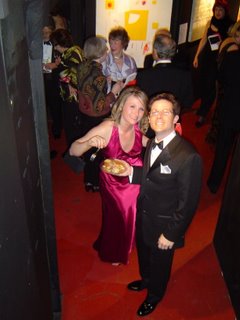
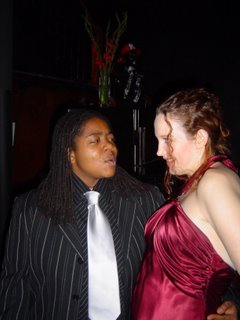
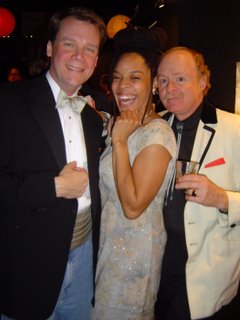
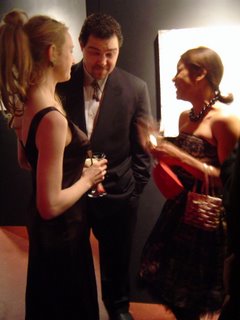
And now, a view of some Richmond streetcar scenes...
All the images below were found on davesrailpix.com. Until I stumbled on them in a search, the only one of this group I'd seen is the first one at top. This was like discovering a trunk in the attic.
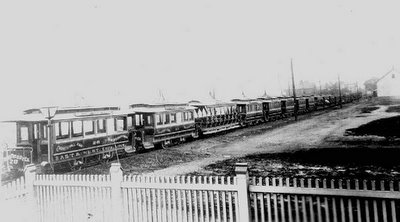 This may not seem to be a historic image, but it is; taken in February 1888 prior to a test of electric streetcars on Richmond's Church Hill. This line of cars started and ran simultaneous eastward into downtown.
This may not seem to be a historic image, but it is; taken in February 1888 prior to a test of electric streetcars on Richmond's Church Hill. This line of cars started and ran simultaneous eastward into downtown.The innovation of Annapolis-trained Frank Julian Sprague inaugurated what is arguably the first practical and consistent operating electric rail system. Variations remain in use today throughout the world, but not in Richmond, Va. If a modernized version of this system was still in operation, it would be two years shy of its 120th anniversary. Richmond, with its fondness for nostalgic commemorations, missed the train on this one.
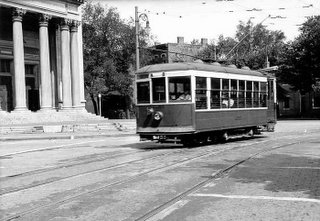
This isn't a European city; but Richmond, Virginia, at Laurel Street and Floyd Avenue, between the Cathedral of the Sacred Heart and Monroe Park. You could colorize this image and persuade people that the picture is of a more recent vintage than circa 1945.
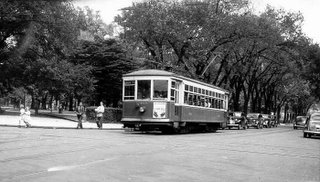 Another "you need to look twice" picture; this is Laurel and Main streets next to Monroe Park. Aside from the period cars, this image could almost have been taken today, making it all the more pathetic that at the moment when the Richmond region needed such clean and efficient transit most, on the brink of sprawl in 1949, the system was scrapped.
Another "you need to look twice" picture; this is Laurel and Main streets next to Monroe Park. Aside from the period cars, this image could almost have been taken today, making it all the more pathetic that at the moment when the Richmond region needed such clean and efficient transit most, on the brink of sprawl in 1949, the system was scrapped.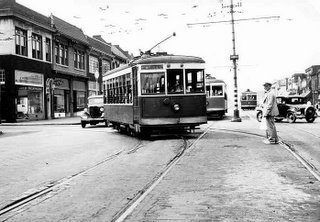 Laurel and Broad streets, taken probably some five or more years earlier than the above picture. All the structures on the left, thankfully, remain standing in 2006. This today is on the edge of Virginia Commonwealth University's urban campus. The institution--with more than 20,000 students, with many of them commuters-- could use these streetcars now.
Laurel and Broad streets, taken probably some five or more years earlier than the above picture. All the structures on the left, thankfully, remain standing in 2006. This today is on the edge of Virginia Commonwealth University's urban campus. The institution--with more than 20,000 students, with many of them commuters-- could use these streetcars now.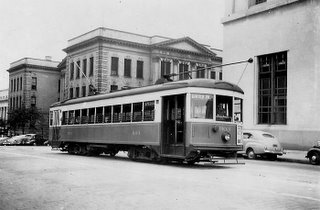 This streetscape on East Broad hasn't undergone major changes since circa 1948 when this was made; behind the car from left, is the Virginia Department of Transportation, the Charlotte Williams Memorial Hospital and at right, what was then the Library of Virginia, within the past two years made over into the Patrick Henry Building for use by the Virginia legislature.
This streetscape on East Broad hasn't undergone major changes since circa 1948 when this was made; behind the car from left, is the Virginia Department of Transportation, the Charlotte Williams Memorial Hospital and at right, what was then the Library of Virginia, within the past two years made over into the Patrick Henry Building for use by the Virginia legislature.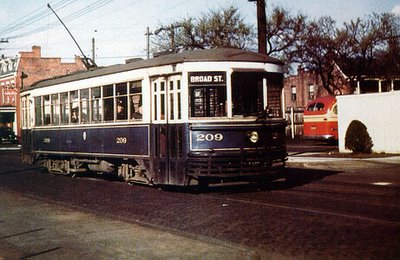
In living color, #209 signed for Broad Street but shown here probably rolling either to trolley shops in the 1600 block of West Main, or on the West Cary Street trolley barns.
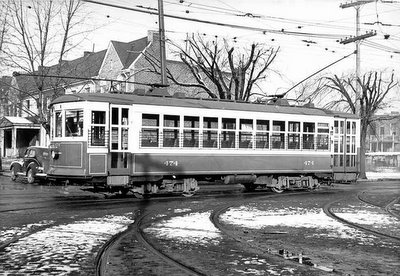
This is a car signed for the Parkwood line and this looks like my neighborhood on the very night I'm writing this--down to the melting snow on the street!
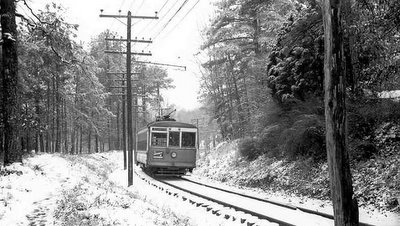
Somewhere near Richmond, Va. The caption says this is "the Westham line" which makes sense, as it is in what was a fairly wooded area near the University of Richmond campus in the city's Near West End.
This picture makes me sigh.
How might an early 21st century Richmond electric streetcar system look? Who knows, but I fantasize it might resemble some of these beauties below.
 This cutie to the left is called Eva, and she's a "Special Train." I'll say she is. I imagine versions of her quiet and contemporary-retro whisking along a Cary Street devoid of cars.
This cutie to the left is called Eva, and she's a "Special Train." I'll say she is. I imagine versions of her quiet and contemporary-retro whisking along a Cary Street devoid of cars.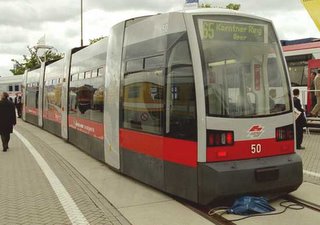
Above right is Ulf, whom I can see gliding along Hull
Street to points south, and north to Ashland, where the scenery would make for a pleasant travel experience.
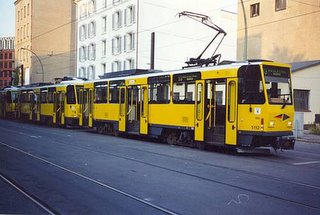
Not especially attractive, but efficient, and using Sprague's princibles devised in Richmond more than a century ago, are two Berlin street cars. The color makes them easily identifiable on the busy streets to bicyclists and pedestrians. I'll take a few, but in the Crayola jumbo variety, please.--HEK

